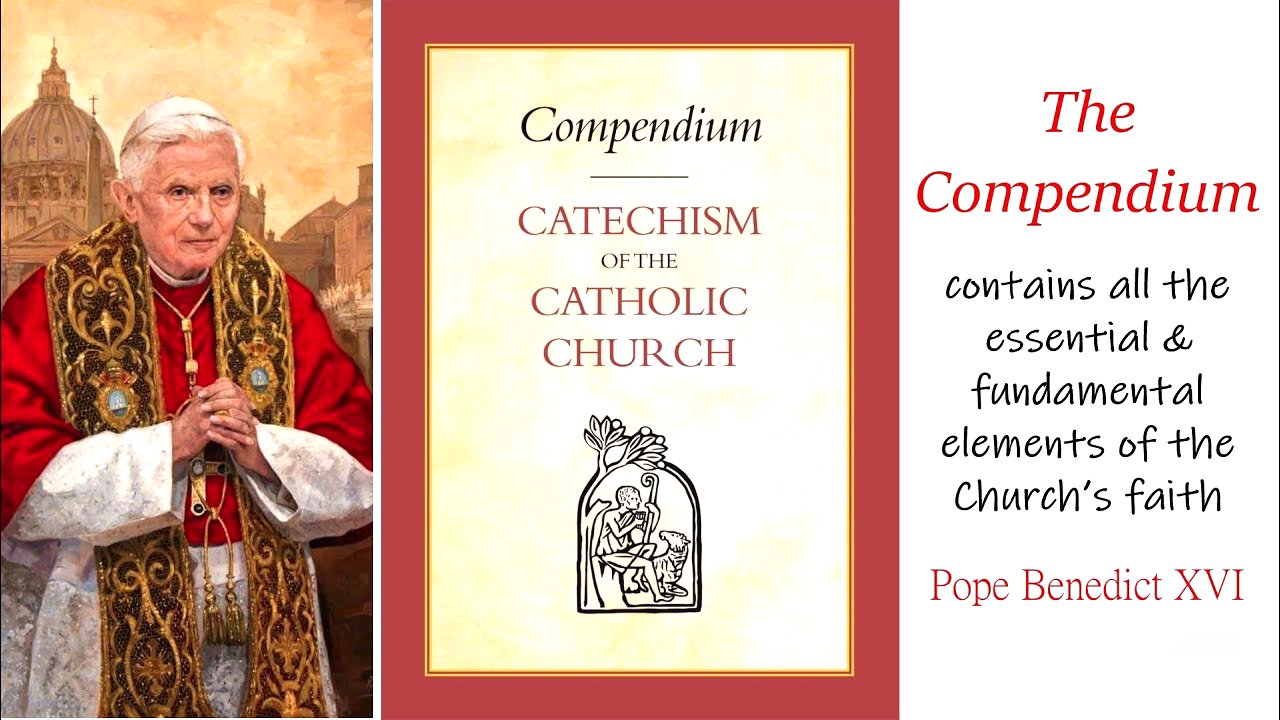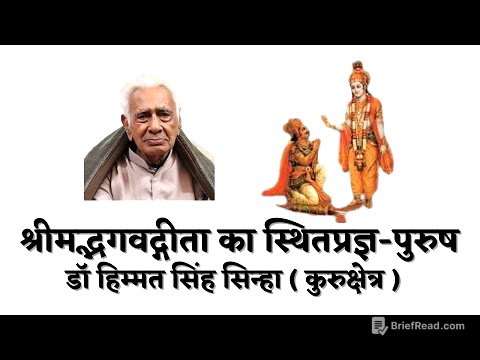TLDR;
This video provides a detailed review of the Compendium of the Catechism of the Catholic Church, highlighting its traditional approach while pointing out a few areas of concern. The speaker praises the book's high quality, traditional artwork, and faithful summary of Catholic doctrine. However, he identifies issues with the Compendium's stance on the death penalty, its interpretation of salvation outside the Church, and certain nuances in its presentation of virtues and prayers.
- The Compendium is generally excellent and traditional, suitable for modern readers.
- Key issues include the death penalty, salvation outside the Church, and minor points on virtues and prayers.
- The speaker emphasizes the importance of adhering to traditional Catholic teachings and correcting any deviations in the Compendium.
Intro [0:01]
The speaker introduces the Compendium of the Catechism of the Catholic Church, describing it as a small, modern catechism that is generally excellent and traditional. He notes that there are only two or three points that require manual correction. He recommends the book, especially for those seeking a concise summary of Catholic teachings, but advises making personal adjustments to address the identified issues. The speaker mentions giving the book as a confirmation gift to his nieces, intending to clarify the problematic sections with them.
About the Book [1:45]
The speaker discusses the physical qualities of the Compendium, noting its high-quality paper, traditional iconography, and artwork. He mentions that it was prepared under Pope John Paul II and published under Pope Benedict XVI. The book is divided into four sections: the profession of faith (the Creed), the celebration of Christian mysteries (the Sacraments), life in Christ (the Ten Commandments), and Christian prayer (the Our Father). The speaker highlights that the British version of the book has excellent paper and print quality.
Moto Proprio and Companion [5:10]
The speaker references Pope Benedict XVI's moto proprio, which introduces the Compendium as a faithful summary of the Church's faith and a synthesis of the Catechism of the Catholic Church. He clarifies that he is not referring to the "Companion" to the Catechism, which is a large volume containing the full text of every footnote in the Catechism. The speaker recalls reviewing the Catechism and its companion, noting a critique by the Society of Saint Pius X. He emphasizes the rock-solid nature of the Roman Catechism (Council of Trent) but recommends the Compendium for its conciseness and traditional content.
First Section: I Believe [8:43]
The speaker begins reviewing the first section of the Compendium, which covers the profession of faith. He appreciates the traditional Catholic artwork and the straightforward presentation of key doctrines. The speaker notes that the Compendium affirms the historicity of Adam and Eve, original sin, the resurrection of the body, the immortality of the soul, and the reality of the devil. He emphasizes that the Compendium does not treat Noah's flood as a myth but as a historical event.
Apostolic Tradition and Sacred Scripture [10:35]
The speaker emphasizes that the Compendium teaches that revelation is complete with the death of the last Apostle, and that the faith of the Church must gradually grasp its full significance over time. He clarifies that this refers to the development of doctrine, not the evolution of dogma, which he condemns as heresy. The speaker defines apostolic tradition as the transmission of the message of Christ through preaching, bearing witness, institutions, and worship. He condemns liturgical innovations that discard apostolic tradition passed down through worship.
Inspiration and Inerrancy of Scripture [14:59]
The speaker highlights the Compendium's teaching on the inerrancy of Scripture, stating that God himself is the author of sacred scripture, and the Holy Spirit inspired the human authors to write what He wanted to teach. He emphasizes that this is crucial against modernists who deny the inspiration of Scripture, which leads to the denial of Adam and Eve, the Fall, and the need for redemption. The speaker notes that the Old Testament is also divinely inspired and that Scripture is one, with the God of the Old Testament being the same as the God of the New Testament, refuting Gnosticism.
Faith and Formulas of Faith [19:36]
The speaker discusses the characteristics of faith, emphasizing that it is a supernatural virtue necessary for salvation and a free gift of God. He highlights the importance of the formulas of faith, stating that they express, assimilate, celebrate, and share the truths of the faith through a common language, preventing the dissolution of faith. The speaker notes that the Church confesses one God, Father, Son, and Holy Spirit, and points to one way of salvation.
The Creed and God's Truth [21:04]
The speaker notes that the Compendium includes the Apostles' Creed and the Nicene Creed in both English and Latin. He mentions that the book also provides a section with traditional prayers in both languages. The speaker highlights the Compendium's assertion that God is truth itself and can neither deceive nor be deceived, contrasting this with the Quran, which calls the god of Islam the best of deceivers. He emphasizes that the true God is truth, while the liar is the devil.
Creation and the Human Race [25:00]
The speaker discusses the Compendium's teachings on creation, noting that God created the world out of nothing (ex nihilo). He mentions that the Compendium addresses why God permits evil, stating that God would not permit evil if He did not cause a good to come out of it. The speaker highlights that the Compendium states that God created man and woman to know, serve, and love Him, and that all people form a unity of the human race with a common origin from God.
Original Sin and Spreading the Good News [28:18]
The speaker notes that the Compendium explains original sin and its transmission to the descendants of Adam. He emphasizes that the Compendium does not support the idea of human evolution from multiple ancestors but affirms Adam and Eve as the first parents of all humanity. The speaker highlights the Compendium's teaching that the first disciples burned with the desire to proclaim Jesus Christ to lead all to faith in Him, contrasting this with modern approaches that downplay evangelization.
Incarnation and Mary [32:00]
The speaker discusses the Compendium's explanation of the Incarnation, the union of divinity with humanity in the divine person of Jesus Christ, and why Mary is the Mother of God. He notes that the Compendium affirms Mary's Immaculate Conception and her cooperation in salvation. The speaker highlights that the Compendium presents Jesus as the New Adam and Mary as the New Eve.
Temptation of Jesus and the Kingdom of God [33:14]
The speaker highlights that the Compendium teaches that the temptations of Jesus in the desert recapitulate the temptation of Adam in paradise, again affirming the historicity of Adam and Eve. He notes that the Compendium states that all are invited by Jesus Christ to enter the Kingdom of God, even the worst sinners, who are called to convert and accept. The speaker emphasizes that the Kingdom of Christ on Earth is the Church, and Peter receives the keys of the Kingdom to keep the faith in its integrity and strengthen his brothers.
Paschal Mystery and Resurrection [36:19]
The speaker discusses the Compendium's explanation of the Paschal Mystery, comprising Jesus' passion, death, resurrection, and glorification. He notes that these are symbolized in the Mass. The speaker highlights that the Compendium affirms the resurrection as both a transcendent occurrence and a historical event, verifiable by signs and testimonies. He emphasizes that there is no question of a spiritual resurrection, and that the Compendium teaches that we will be raised up again in our bodies.
The Holy Spirit and the Church [38:37]
The speaker highlights that the Compendium teaches that the Holy Spirit builds, animates, and sanctifies the Church, restoring the divine likeness to the baptized that was lost through sin. He emphasizes that the mission of the Church is to proclaim and establish the Kingdom of God begun by Jesus Christ among all peoples. The speaker notes that the Compendium states that the people of God share in Christ's prophetic office with a supernatural sense of faith, adhering unfailingly to that faith.
The One Church of Christ and the Term "Subsist" [42:27]
The speaker addresses the controversial term "subsist" in relation to the Church of Christ. He explains that the Compendium states that the one Church of Christ subsists in the Catholic Church, governed by the successor of Peter and the bishops in communion with him. The speaker acknowledges that some traditional Catholics dislike the term "subsist," fearing it implies the Church of Christ is broader than the Catholic Church. However, he asserts that the Vatican has clarified that "subsist" means "is," emphasizing that the Catholic Church is the one and only Church of Christ.
Belonging to the Catholic Church and the Jewish People [50:14]
The speaker notes that the Compendium teaches that all human beings are ordered towards the Catholic Church, implying they ought to join it. He addresses the Compendium's statement on the relationship between the Catholic Church and the Jewish people, arguing that the Jewish faith as it exists now (Rabbinic Judaism) is not the same as the faith practiced during the time of Christ, which included sacrifice, temple, and priesthood. The speaker asserts that the Pharisaic Rabbinic faith is not the same faith of the time of Christ.
"Outside the Church There Is No Salvation" [52:51]
The speaker addresses the affirmation "Outside the Church there is no salvation," stating that all salvation comes from Christ the head through the Church. He argues that for those outside the Church, especially those in ecclesial communities originating from the Reformation, salvation is very difficult without the sacraments. The speaker emphasizes the importance of confession and the Eucharist as ordinary means of forgiveness and growth in faith.
Function of Bishops and the Three Parts of the Church [55:25]
The speaker notes that the Compendium describes the function of bishops as teaching, governing, and sanctifying. He mentions that the Compendium refers to the three parts of the Church as the pilgrim Church on Earth (militant), the Church undergoing purification (suffering), and those enjoying the glory of God (triumphant). The speaker highlights the Compendium's teaching on Mary's Assumption into Heaven.
Resurrection of the Body and Hell [56:18]
The speaker discusses the Compendium's teaching on the resurrection of the body, noting that it is both a historical event and a transcendent occurrence. He clarifies that "life everlasting" in the Creed refers to the life of the saints in the new heaven and new earth, not the eternal life of the damned. The speaker highlights that the Compendium affirms the immortality of the soul and the particular judgment immediately after death.
What Hell Consists Of [59:52]
The speaker emphasizes that the Compendium teaches that hell consists of the eternal damnation of those who die in mortal sin. He stresses the importance of examining one's conscience, confessing sins to a priest, and receiving absolution to avoid hell. The speaker quotes the Compendium's description of hell as eternal separation from God, but argues that this is not the only suffering, as the damned also experience eternal fire and torment.
The Eucharist and True Christianity [1:05:12]
The speaker highlights the Compendium's teaching on the Eucharist as the living presence of Jesus and indispensable nourishment for spiritual life. He contrasts this with the actions of bishops and priests who complied with restrictions during the pandemic, preventing the faithful from receiving the Eucharist. The speaker quotes the martyrs who said, "Without the Eucharist, we cannot live," and emphasizes that true Christianity involves preferring death to being deprived of the Eucharist.
Celebration of Christian Mysteries and the Liturgy [1:12:05]
The speaker transitions to the second part of the Compendium, focusing on the celebration of Christian mysteries. He quotes St. Augustine on the sacrifice of Christ. The speaker emphasizes the importance of the liturgy, stating that it is the sacred action par excellence and the summit towards which all activity of the Church is directed. He highlights the principle "lex orandi, lex credendi" (how you pray determines your belief), arguing that changes to the liturgy alter the faith.
Sacraments and Faith [1:14:34]
The speaker emphasizes that the sacraments not only presuppose faith but also nourish, strengthen, and express it through words and ritual elements. He argues that altering the words and rituals, as done in the Novus Ordo, starves the faith. The speaker shares a personal experience of attending both a traditional Roman Rite Mass and a Novus Ordo Mass, noting the vastly different atmosphere and feeling. He urges parents to gradually introduce their children to the traditional Mass.
Sacred Buildings and the Seven Sacraments [1:20:40]
The speaker emphasizes that the Compendium teaches that the liturgy ought to be celebrated in churches and sacred buildings, criticizing popes and bishops who celebrate Mass in stadiums or outdoors. He notes that the architecture of churches is based on the temple. The speaker highlights the Compendium's presentation of the seven sacraments, accompanied by traditional pictures.
Baptism and Salvation [1:23:32]
The speaker addresses the Compendium's teaching on baptism, specifically question 261: "Is baptism necessary for salvation?" He criticizes the Compendium's answer, which states that baptism is necessary for salvation "for all those to whom the Gospel has been proclaimed and who have had the possibility of asking for this sacrament." The speaker argues that this implies that those who have not heard the Gospel might be saved without baptism, undermining the necessity of evangelization.
Salvation Without Baptism and the Church's Teaching [1:26:03]
The speaker addresses the question of whether it is possible to be saved without baptism. He acknowledges the concepts of baptism of desire and baptism of blood, but emphasizes that baptism is the only known means of salvation. The speaker criticizes the Compendium's statement that the Church entrusts children who die without baptism to the mercy of God, arguing that this is an innovation of Paul VI and contradicts the Church's traditional teaching on the necessity of infant baptism.
Holy Orders and Matrimony [1:31:16]
The speaker discusses the Compendium's teaching on Holy Orders, emphasizing that it is one sacrament with three core orders: deacons, priests, and bishops. He notes that the Compendium states that only a baptized man can validly receive this sacrament. The speaker highlights the Compendium's teaching on matrimony, emphasizing that the Church cannot recognize the union of those who are civilly divorced and remarried, as it constitutes adultery.
Divorced and Remarried Catholics [1:44:36]
The speaker emphasizes that the Compendium teaches that those living in adultery cannot receive sacramental absolution or Holy Communion and cannot exercise certain ecclesiastical responsibilities. He notes that this is because their situation objectively contravenes God's law. The speaker transitions to the third part of the Compendium, focusing on life in Christ.
Human Dignity and Beatitude [1:47:12]
The speaker discusses the Compendium's teaching on human dignity, noting that it is rooted in creation in the image and likeness of God. However, he argues that the likeness is lost through sin and restored through baptism. The speaker highlights that the Compendium states that the dignity of the human person requires the uprightness of a moral conscience, implying that those without an upright conscience lack dignity.
Freedom and the Common Good [1:50:42]
The speaker discusses the Compendium's teaching on freedom, emphasizing that the more one does what is good, the freer one becomes. He notes that the choice of evil is an abuse of freedom and leads to slavery to sin. The speaker addresses the issue of religious freedom, arguing that it is not an absolute right and must be exercised within the limits of the common good and a just public order.
Illicit Acts and the Common Good [2:02:08]
The speaker highlights that the Compendium teaches that some acts are always illicit, such as blasphemy, homicide, and adultery. He emphasizes that the dignity of the human person requires an upright moral conscience. The speaker notes that the Compendium mentions public order but also emphasizes the common good as a criterion for restricting freedom.
Human Virtues and Theological Virtues [2:05:38]
The speaker notes a minor quibble with the Compendium's presentation of virtues, arguing that it should start with the theological virtues (faith, hope, and charity) before discussing the human virtues (prudence, justice, temperance, and fortitude). He emphasizes that the human virtues derive their strength from the theological virtues.
Acceptance of God's Mercy and the Ten Commandments [2:06:47]
The speaker highlights that the Compendium teaches that accepting God's mercy requires admitting faults and repenting of sins. He notes that the Compendium defines sin as a word, act, or desire contrary to the eternal law and an offense against God. The speaker emphasizes that the Ten Commandments lay the foundations of human vocation and express the fundamental duties of man towards God and neighbor.
Keeping the Commandments and the Magisterium [2:18:33]
The speaker highlights that the Compendium teaches that it is possible to keep the Ten Commandments because Christ enables us to do so with the gift of the Holy Spirit and His grace. He emphasizes that the duty of the Magisterium is to preach the faith and that this duty extends to specific precepts of the natural law, as their observance is necessary for salvation.
Political and Social Life and the Ten Commandments [2:23:19]
The speaker highlights that the Compendium teaches that Christians participate in political and social life by animating temporal realities with the Christian spirit. He emphasizes that Christians must bear witness to the truth of the Gospel in every field of activity, both public and private, even with the sacrifice of their lives. The speaker notes that the Compendium emphasizes the importance of the Ten Commandments.
Legitimate Defense and Punishment [2:26:15]
The speaker discusses the Compendium's teaching on legitimate defense, stating that it is not murder if someone dies while defending oneself or others without using excessive force. He transitions to the topic of punishment, specifically capital punishment, noting that this is a point of contention. The speaker promises to compare the Compendium's teaching with the original Catechism of the Catholic Church and the Catechism of the Council of Trent.
Capital Punishment: The Francis Version [2:32:47]
The speaker begins a detailed analysis of the Compendium's teaching on capital punishment, noting that the current version reflects Pope Francis's innovation, which contradicts traditional Catholic doctrine. He reads the Compendium's statement that recourse to the death penalty is "inadmissible" because it attacks the inviolability and dignity of the person. The speaker criticizes this view, arguing that it contradicts Scripture and the Church's historical teaching.
Capital Punishment: The John Paul II Version [2:38:54]
The speaker compares the Compendium's current teaching on capital punishment with the version under Pope John Paul II. He notes that while John Paul II expressed personal opposition to the death penalty, the Compendium at that time acknowledged the state's right to inflict penalties commensurate with the gravity of the crime, with the primary scope being to redress the disorder caused by the offense.
Capital Punishment: The Original Catechism [2:40:21]
The speaker presents the original version of the Catechism of the Catholic Church, which he could not find online but possesses in print. He highlights that the original Catechism affirms the traditional teaching of the Church, acknowledging the right and duty of legitimate public authorities to punish malefactors by means of penalties commensurate with the gravity of the crime, "not excluding, in case of extreme gravity, the death penalty."
Contrasting the Versions and the Compendium's Error [2:49:35]
The speaker contrasts the three versions of the Catechism, emphasizing that Pope Francis's revision contradicts the traditional teaching of the Church and Scripture. He reiterates his intention to correct this error when discussing the Compendium with his nieces. The speaker identifies another error in the Compendium, specifically question 482, which states that earthly peace requires the equal distribution of goods, which he condemns as communism and socialism.
The Universal Destination of Goods and Civil Authority [3:06:35]
The speaker clarifies the concept of the universal destination of goods, stating that it does not contradict private property but prevents a small group from controlling all resources. He highlights that the Compendium condemns usury and affirms the importance of private property and individual freedom. The speaker emphasizes that Christians participate in political and social life by animating temporal realities with the Christian spirit and bearing witness to the truth of the Gospel in every field of activity.
Purity and the Social Climate [3:10:38]
The speaker highlights that the Compendium teaches that purity requires the purification of the social climate through a constant struggle against moral permissiveness, which is founded on an erroneous conception of human freedom. He notes that the Compendium admits that different languages caused division among people, contrasting this with the destruction of the unity of the Latin liturgy after Vatican II.
Prayer and the Our Father [3:14:01]
The speaker transitions to the final section of the Compendium, focusing on prayer and the Our Father. He emphasizes that all prayers are vocations and go through Jesus Christ. The speaker highlights that the Compendium uses the unique word "supersubstantial bread" in relation to the petition "Give us this day our daily bread," indicating that it refers not just to regular food but also to the Word of God and the Body of Christ.
Lead Us Not Into Temptation and the Prayers [3:17:32]
The speaker criticizes Pope Francis's attempt to change the phrase "Lead us not into temptation," arguing that it is too difficult to understand despite being the exact translation of the Greek. He quotes the Compendium's explanation of the phrase, emphasizing that it asks God not to leave us alone in the power of temptation and to help us discern between trials and temptations. The speaker notes that the Compendium includes traditional prayers in English and Latin.
Formulas of Catholic Doctrine and the Act of Faith [3:24:04]
The speaker highlights the Compendium's section on formulas of Catholic doctrine, including the Ten Commandments, the Golden Rule, the Beatitudes, and the virtues. He notes that the Compendium includes the Luminous Mysteries of the Rosary, which he criticizes as an addition not revealed by the Virgin Mary. The speaker compares the Compendium's versions of the Act of Faith, Act of Hope, Act of Charity, and Act of Contrition with the traditional versions, noting that the Compendium's versions are watered down and remove uncomfortable elements like hell.
Conclusion and Final Thoughts [3:41:07]
The speaker concludes by reiterating that the Compendium is an excellent book overall, despite the identified issues. He encourages viewers to correct the problematic sections and use the Compendium as a resource for themselves and their families. The speaker urges viewers to stay in the true Church, which is the one and only Church of Jesus Christ, the Catholic and Apostolic Church.









